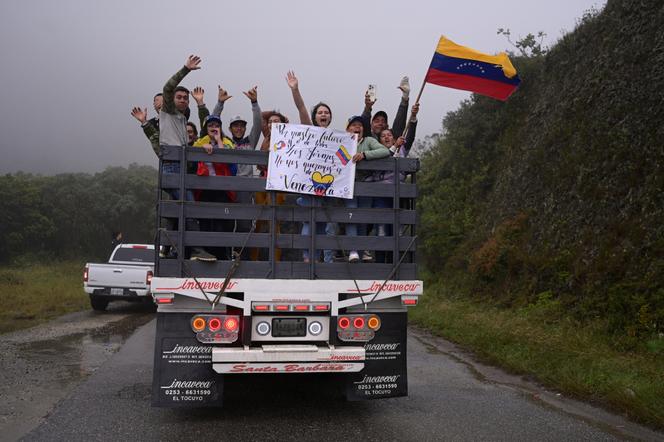Supporters of the opposition candidate in the Venezuelan presidential election, Edmundo Gonzalez Urrutia, in the state of Mérida on June 26, 2024. On the poster: 'No nos queremos ir de Venezuela' ('We do not want to leave Venezuela'). GABY ORAA / REUTERS
How does a country that has lost a quarter of its population in ten years live and vote? On Sunday, July 28, 21 million Venezuelan voters are called to the polls to re-elect the incumbent president, Nicolas Maduro, a candidate for a third term, or to bring Edmundo Gonzalez, the unitary candidate of the major opposition parties, to power.
According to observers, between 4 million and 5 million of them will not be able to vote because they have emigrated. Only 69,000 Venezuelans living abroad were able to register on the electoral lists opened in consulates. Polling institutes are questioning the significance of this 'forced abstention'. They emphasize the importance of migrants in the electoral dynamics, as the fate of the Bolivarian revolution initiated a quarter of a century ago by Hugo Chavez (1999-2013) and that of his heirs, the Chavistas, is being played out at the ballot box.
Ruben Sulbara, 73 years old, lives alone in Caracas, without his wife, who left two years ago to join their daughter, working as a maid in the United States. He believes what Nicolas Maduro says and what the media repeat: he is convinced that the sanctions decreed by Washington are the exclusive cause of the country's economic debacle, of the emigration that has torn families apart, and of his sadness. But he admits that if his wife and daughter had been able to vote, they would have chosen Edmundo Gonzalez.
'"We will reunite families", promises opposition leader Maria Corina Machado wherever she goes. The crowd cheers. In the city of Maturin, in the east of the country, a child holds a sign: "Bring back my parents".
Mrs. Machado, who had won the opposition primaries, was prevented from running for president herself by the judiciary. For several weeks now, she has been traveling across the country to campaign for Edmundo Gonzalez. At 74 years old, he moves around very little. 'By making family reunification a central theme of her campaign, Maria Corina Machado hit the mark,' notes human rights activist Rafael Uzcategui. 'In a country tired of ideological speeches, emotion is a powerful mobilization driver.'
Absence of statistical monitoring
'All Venezuelan families, whether rich, less rich, poor, Chavistas or anti-Chavistas, are all affected by emigration,' notes researcher Ronal Rodriguez, from the University of the Rosary, in Bogota, Colombia.
According to international organizations, which include minors in their statistics, more than 7.7 million Venezuelans have taken the path of exile in total. A record figure for a country not at war, and moreover "probably" underestimated, specifies the Regional Inter-Agency Coordination Platform for Refugees and Migrants from Venezuela, which publishes it. It places the country in third place globally in terms of emigration, behind Syria and Sudan.
You have 72.7% of this article left to read. The rest is reserved for subscribers.
